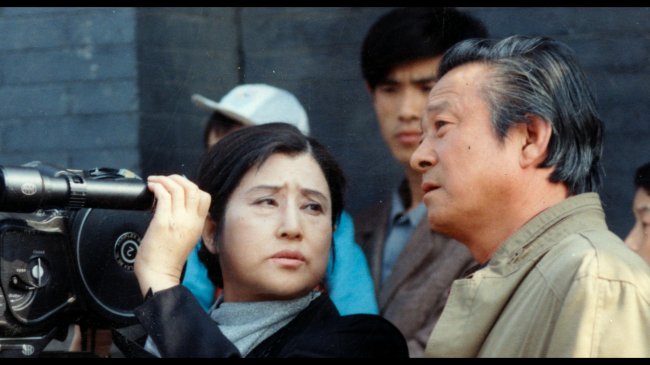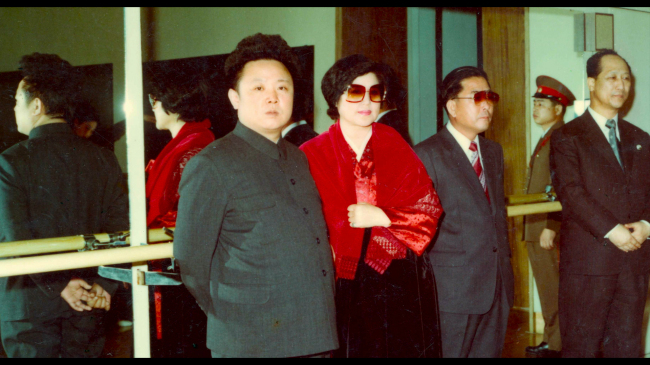Lives there a film fan anywhere who doesn’t wish his or her country made better films, who couldn’t sympathize with Kim Jong-il when he’s heard to say, “There’s nothing new to our films. We don’t have any films that get into film festivals. People here are so close-minded?"
Kim Jong-il was no everyday film fan, however. Oh, no. He was the absolute ruler of North Korea, and though you’d think he’d have more important matters to attend to, he not only did something about his complaint, he did it in a frankly astonishing way.
“The Lovers and the Despot,” a beyond belief documentary by Rob Cannan and Ross Adam, closely examines the singular case of top South Korean director Shin Sang-ok and popular actress (and Shin’s former wife) Choi Eun-hee.
In the late 1970s, Kim had these movie luminaries abducted and brought to his country, where they were coerced and convinced to make films for the North. “I want you to be world famous,” the dictator told them. “Let’s show the West what we are capable of.”
Because this tale is so outlandish, Shin knew that it would be hard to believe. So he and his wife contrived to secretly tape-record some of Kim’s conversation (a former CIA operative vouches for the voice’s authenticity), a vocal record that forms a key element of the narrative.
Shin died in 2006, North Korea’s Kim five years later, but Choi, age 89, is still alive, and “The Lovers and the Despot” is centered around her on-camera recollections.
 |
Director Shin Sang-ok (right) and popular actress (and Shin’s former wife) Choi Eun-hee appear in the documentary “The Lovers and the Despot.” (Atnine Film) |
It is the lovers’ part that takes up the first segment of the documentary, as Choi talks about her passion for acting, her popularity (she’s seen sharing the spotlight with Marilyn Monroe) and her relationship with Shin, whom she met on a movie set. “He said we should make films together forever,” the actress remembers, but life as the director’s wife was problematic. Shin was a workaholic who never expressed emotion and who left Choi and their two adopted children (both now adults and participants in the film) for another woman.
In 1978, Choi went to Hong Kong to meet a woman she thought was a producer but was actually a North Korean agent. The actress was bundled onto a speedboat (“Despot” offers some discreet re-creations) and taken to North Korea, where Kim himself met her on the dock. Courteous and respectful, the absolute ruler seemed to Choi “like an artist who loved films.” But though he could be charm itself, Kim also let the actress know without saying it directly that “if I betrayed him, he’d kill me.”
Choi’s life in North Korea was initially one of enforced idleness involving pruning trees, planting a garden and taking long walks. “I was told what to eat, what to wear; there was nothing of me left,” she remembers. “Like a doll I did what I was told.”
Director Shin, buffeted at the time by financial difficulties, soon went to Hong Kong looking for his ex-wife. He ended up being taken to North Korea as well, but his lot was initially not as smooth. He was imprisoned for years and took to writing letters to Kim promising, “If you release me, I will make good films for North Korea.”
Clearly a master at playing the long game, Kim Jung-il waited five years before reuniting actress and director, offering kind of an apology for the “misunderstanding” about the way they had been treated.
Over the next 27 months, often sleeping only a few hours per night, the couple made no less than 17 films for North Korea, including what Choi describes as the first love story ever seen on that country’s screens.
 |
A scene from “The Lovers and the Despot” (Atnine Film) |
There was no question that Choi enjoyed the professional exposure, including a best actress prize at the Moscow Film Festival, that all this moviemaking gave her, and Shin is said to have enjoyed not having to worry about budgets for the first time in his life.
The director, one taped moment tells us, also enjoyed his closeness with the absolute ruler. “In a way we really hit it off,” Shin says. “When we meet he leaves his guards outside. He completely adores me.”
However, fears of what the autocrat might do to them if they fell from favor were intense, and the couple fled to the U.S. Embassy during a 1986 trip to Vienna and asked for political asylum. Their story took further unlikely turns — Shin produced Disney’s “Three Ninjas,” of all things — but nothing to match their North Korea years.
(Tribune Content Agency)
By Kenneth Turan
Los Angeles Times







![[Weekender] Korea's traditional sauce culture gains global recognition](http://res.heraldm.com/phpwas/restmb_idxmake.php?idx=644&simg=/content/image/2024/11/21/20241121050153_0.jpg)

